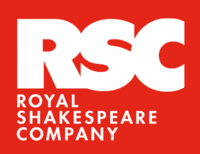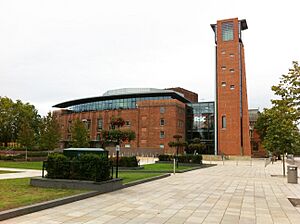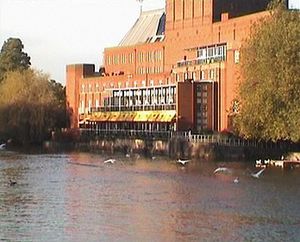Royal Shakespeare Company facts for kids
 |
|
| Abbreviation | RSC |
|---|---|
| Predecessor | Shakespeare Memorial Theatre Ltd. |
| Formation | 23 April 1879 |
| Founder | Peter Hall |
| Founded at | Stratford-upon-Avon |
| Type | Charity |
| Legal status | Charity incorporated under royal charter |
| Purpose | Promote Shakespeare's plays to a truly diverse audience and their relevance to today's society. |
| Headquarters | Stratford-upon-Avon |
| Location | |
| Charles III | |
|
Chief Executive Officer
|
Andrew Leveson |
|
Main organ
|
Board of Trustees |
| Expenses (2019) | £82.98 million |
| Endowment (2019) | £86.43 million |
|
Staff (2019)
|
1205 |
The Royal Shakespeare Company (RSC) is a famous British theatre group. It is based in Stratford-upon-Avon, England. This is the hometown of the famous playwright William Shakespeare.
The RSC has over 1,000 staff members. They put on about 20 new plays each year. You can see their shows in Stratford-upon-Avon, London, and on tours. They also travel to other parts of the UK and around the world.
The company's main home is in Stratford-upon-Avon. Here, they have two special theatres: the Royal Shakespeare Theatre and the Swan Theatre. These theatres were updated as part of a big project. They reopened in November 2010.
The RSC performs plays by Shakespeare and other writers from his time. They also create brand new plays by artists living today.
Contents
The RSC's Story
Early Theatre in Stratford
People have been performing plays in Stratford-upon-Avon since Shakespeare's time. The first recorded Shakespeare play there was Othello in 1746. This show helped raise money to fix Shakespeare's monument.
The first building built to honor Shakespeare was the Jubilee Pavilion in 1769. Since then, many buildings have been used for Shakespeare's plays.
Building the Memorial Theatre
The first permanent theatre for Shakespeare's plays was built in 1827. But it was later taken down. The RSC's story really began with the Shakespeare Memorial Theatre. A local brewer, Charles Edward Flower, had the idea for it.
He gave a large piece of land by the River Avon. In 1875, he started a worldwide effort to build a theatre in Shakespeare's birthplace. The theatre opened on April 23, 1879. It was a Victorian-Gothic building with over 700 seats. The first play performed was Much Ado About Nothing.
Fire and Rebuilding
On March 6, 1926, a fire broke out at the theatre. The building was mostly destroyed. The company then used a local cinema for their Shakespeare festivals. Money was raised to rebuild the theatre, with many donations from America.
In 1928, Elisabeth Scott, a 29-year-old architect, was chosen to design the new theatre. Her modern design was praised by some, including George Bernard Shaw. The new building opened on Shakespeare's birthday, April 23, 1932. This building was used until 2007 when it closed for a major update.
Key Dates for the RSC Theatres
- 1932 – The new Shakespeare Memorial Theatre opened.
- 1961 – The Stratford theatre's name officially became "Royal Shakespeare Theatre." The company became the Royal Shakespeare Company.
- 1974 – The Other Place, a smaller theatre, opened in Stratford.
- 1986 – The Swan Theatre opened, built inside the old 1879 Memorial Theatre shell.
- 2010 – The Royal Shakespeare and Swan Theatres reopened after a big renovation.
- 2016 – The Other Place was reopened as a 200-seat studio theatre.
The Royal Shakespeare Company Today
How the RSC Started
In 1959, Peter Hall became the director of the Memorial Theatre. He wanted to create a permanent group of actors. He believed this would help them perform Shakespeare's plays better.
On March 20, 1961, it was officially announced. The Shakespeare Memorial Theatre would be called the Royal Shakespeare Theatre. The company would be known as the Royal Shakespeare Company.
This was a very new idea at the time. Peter Hall wanted a year-round company with a base in London. This would allow them to perform plays from Stratford in the city.
In 1962, the RSC faced some challenges. The Royal National Theatre did not want another theatre company in London. But the RSC managed to get the Aldwych Theatre as its London home.
Later, in 1982, the company moved its London shows to the Barbican Centre. They even helped design the Barbican Theatre and The Pit. However, in 2002, the RSC left the Barbican. They wanted to focus more on touring their shows.
New Ideas and Growth
The RSC realized they needed smaller theatres for some plays. In 1971, they used a space in London called The Place. They built their own theatre there for 330 people.
In 1974, Buzz Goodbody, the company's first female director, helped create The Other Place in Stratford. This small studio theatre could seat 140 people. It was a big success.
A famous production of Macbeth was staged at The Other Place in 1976. It starred Ian McKellen and Judi Dench. Their performances were highly praised. Judi Dench's performance was later voted the greatest by an actress in the company's history.
In 1986, the RSC opened its third theatre in Stratford, called The Swan. It was designed to perform plays by Shakespeare's friends and European writers. It opened with The Two Noble Kinsmen.
Costumes and Props
The RSC has the largest in-house costume-making workshop in British theatre. It is known worldwide for its amazing work. In 2021, the RSC raised over £8 million to update this department. The old workshop was described as "Dickensian" because it was so old.
The prop-makers also design and create many props for the shows. They have a special "Prop Shop" in Stratford-upon-Avon where most props are made.
Challenges and Comebacks
The RSC faced some tough times in the late 1980s and early 1990s. There were funding problems. The company even stopped performing in London for a while.
Adrian Noble, a new artistic director, tried to fix things. He wanted to replace the Royal Shakespeare Theatre with a "Shakespeare Village." But his plans did not work out.
In 2003, Michael Boyd took over. The company had a large debt. But Boyd worked hard to improve the RSC's finances and reputation. He put on a year-long festival of all Shakespeare's plays. This helped bring the company back to success.
In 2007, the long-awaited theatre renovations in Stratford began. A temporary theatre, the Courtyard Theatre, was built. This allowed shows to continue while the main theatres were being updated.
Modern Initiatives
The RSC is the only British member of the Union of the Theatres of Europe.
In 2008, the RSC started a campaign called 'Stand up for Shakespeare'. This campaign helps children and young people have a good experience with Shakespeare. They encourage kids to "Do It on Your Feet, See It Live, Start It Earlier."
In 2010, the RSC opened new education spaces. In 2011, they started a £5 ticket scheme for young people aged 16 to 25.
In 2012, the RSC put on the World Shakespeare Festival. This celebrated Shakespeare as a global playwright. They worked with many arts groups from the UK and other countries.
Since 2013, the RSC has been broadcasting its plays in cinemas worldwide. They also stream them into schools. This allows more people to see their productions.
In 2016, the RSC opened its first permanent exhibition, called 'The Play's The Thing'. On April 23, 2016, they held a special show called 'Shakespeare Live!'. It was broadcast on BBC Two to mark 400 years since Shakespeare's death. Many famous actors took part.
In 2019, the RSC ended its partnership with an oil company. This happened after students threatened to boycott the theatre. Young people felt the sponsorship was a barrier to engaging with the RSC.
In 2023, Daniel Evans and Tamara Harvey became the new joint Artistic Directors. Their first season of plays began in April 2024.
Artistic Directors
- Peter Hall (1960–1968)
- Trevor Nunn (1968–1978)
- Trevor Nunn and Terry Hands (1978–1986)
- Terry Hands (1986–1991)
- Adrian Noble (1991–2003)
- Michael Boyd (2003–2012)
- Gregory Doran (2012–2022)
- Erica Whyman (2021–2023) (Acting Artistic Director)
- Daniel Evans and Tamara Harvey (2023– )
Theatres of the RSC
The RSC has three main theatres in Stratford-upon-Avon:
- The Royal Shakespeare Theatre: This theatre has 1,060 seats and a special stage that sticks out into the audience. It reopened in November 2010.
- The Swan Theatre: This is a smaller theatre with 461 seats. It also has a stage that sticks out.
- The Other Place: This is a studio theatre used for rehearsals and developing new plays. It reopened in April 2016.
The Courtyard Theatre was a temporary theatre. It was used while the Royal Shakespeare Theatre and Swan Theatre were being renovated. It was a test version for the new Royal Shakespeare Theatre's design. It seated 1,045 people. In July 2021, a temporary outdoor theatre called the Lydia & Manfred Gorvy Garden Theatre was built. This allowed shows to return during the COVID-19 pandemic. It was used again in 2024 as The Holloway Garden Theatre.
The RSC has also performed in many London theatres. These include the Aldwych Theatre, The Place, the Donmar Warehouse, and the Barbican Centre. They have also had seasons at the Mermaid Theatre, Almeida Theatre, Roundhouse, Young Vic, Playhouse Theatre, Novello Theatre, and Gielgud Theatre.
The Theatre Royal in Newcastle upon Tyne is also a regular home for the Royal Shakespeare Company.
Famous Productions
- Coriolanus, directed by Peter Hall (1959)
- King Lear, directed by Peter Brook (1962)
- Measure for Measure directed by John Blatchley (1962)
- The Wars of the Roses, adapted from Shakespeare's plays (1963)
- Marat/Sade by Peter Weiss, directed by Peter Brook (1964)
- The Homecoming by Harold Pinter, world premiere (June 1965)
- Staircase (1966)
- Hamlet directed by Peter Hall (1965)
- A Midsummer Night's Dream, directed by Peter Brook (1970)
- Old Times by Harold Pinter (1971)
- Julius Caesar directed by Trevor Nunn (1973)
- Antony and Cleopatra directed by Trevor Nunn (1973)
- Richard II, directed by John Barton (1973–74)
- Travesties by Tom Stoppard, world premiere (June 1974)
- The Marrying of Ann Leete by Harley Granville Barker (September 1975)
- Hamlet, starring Ben Kingsley (1976)
- Romeo and Juliet, starring Ian McKellen and Francesca Annis (March 1976)
- Much Ado About Nothing, starring Judi Dench and Donald Sinden (April 1976)
- The Iceman Cometh by Eugene O'Neill (May 1976)
- The Comedy of Errors, a musical (September 1976)
- Wild Oats by John O'Keeffe (December 1976)
- Macbeth, directed by Trevor Nunn starring Judi Dench and Ian McKellen (1976–77)
- Privates on Parade by Peter Nichols, world premiere (February 1977)
- Destiny by David Edgar, world premiere (May 1977)
- Twelfth Night directed by Jon Amiel (1978)
- The Greeks adapted by John Barton (1980)
- The Life and Adventures of Nicholas Nickleby adapted for the stage (1980)
- King Lear directed by Adrian Noble (1992)
- Much Ado About Nothing directed by Terry Hands (1992)
- Richard III, directed by Bill Alexander (1984)
- Les Misérables by Claude-Michel Schoenberg and Alain Boublil (1985–2019)
- Les liaisons dangereuses by Christopher Hampton, world premiere (1985)
- Macbeth directed by Adrian Noble (1986)
- Titus Andronicus directed by Deborah Warner (1988)
- The Plantagenets adapted from Shakespeare's history plays (1988)
- Othello directed by Trevor Nunn (1989)
- The Master Builder directed by Adrian Noble (1989)
- The Winter's Tale directed by Adrian Noble (1992)
- Hamlet directed by Adrian Noble (1992)
- King Lear directed by Adrian Noble (1993)
- Coriolanus directed by David Thacker (1994)
- This England: The Histories, a season of Shakespeare's history plays (2000)
- Hamlet directed by Michael Boyd (2004)
- The Crucible by Arthur Miller (2006)
- Pericles directed by Dominic Cooke (2006)
- King Lear and The Seagull starring Ian McKellen and Frances Barber (2007)
- Margaret Atwood's The Penelopiad (2007)
- The Histories (2008)
- Hamlet directed by Gregory Doran, with David Tennant as Hamlet (2008)
- Roald Dahl's Matilda the Musical (2010)
- Love's Labour's Lost directed by Christophe Luscombe (2014)
- Wolf Hall based on the novels by Hilary Mantel (2015)
- Oppenheimer by Tom Morton-Smith (2015)
- The Tempest directed by Gregory Doran (2016)
- Imperium (play cycle): Conspirator and Imperium: Dictator (2017)
- Antony and Cleopatra directed by Iqbal Khan (2017)
- Coriolanus directed by Angus Jackson (2017)
- Julius Caesar directed by Angus Jackson (2017)
- Titus Andronicus directed by Blanche McIntyre (2017)
- Twelfth Night directed by Christopher Luscombe (2017)
- Venus and Adonis directed by Gregory Doran (2017)
- Hamlet directed by Simon Godwin (2016, 2018)
- King Lear, directed by Gregory Doran (2016, 2018)
- Macbeth directed by Polly Findlay (2018)
- Romeo and Juliet directed by Erica Whyman (2018)
- The Merry Wives of Windsor directed by Fiona Laird (2018)
- Troilus and Cressida directed by Gregory Doran (2018)
- Timon of Athens directed by Simon Godwin (2018)
- The Boy in the Dress by David Walliams (2019)
- The Comedy of Errors directed by Phillip Breen (2021)
- The Magician's Elephant (2021)
- Richard III directed by Gregory Doran (2022)
- My Neighbour Totoro adapted by Tom Morton-Smith (2022)
- Cowbois by Charlie Josephine (2023)
- A Midsummer Night's Dream, directed by Eleanor Rhode (2024)
See also
 In Spanish: Royal Shakespeare Company para niños
In Spanish: Royal Shakespeare Company para niños
 | Percy Lavon Julian |
 | Katherine Johnson |
 | George Washington Carver |
 | Annie Easley |



